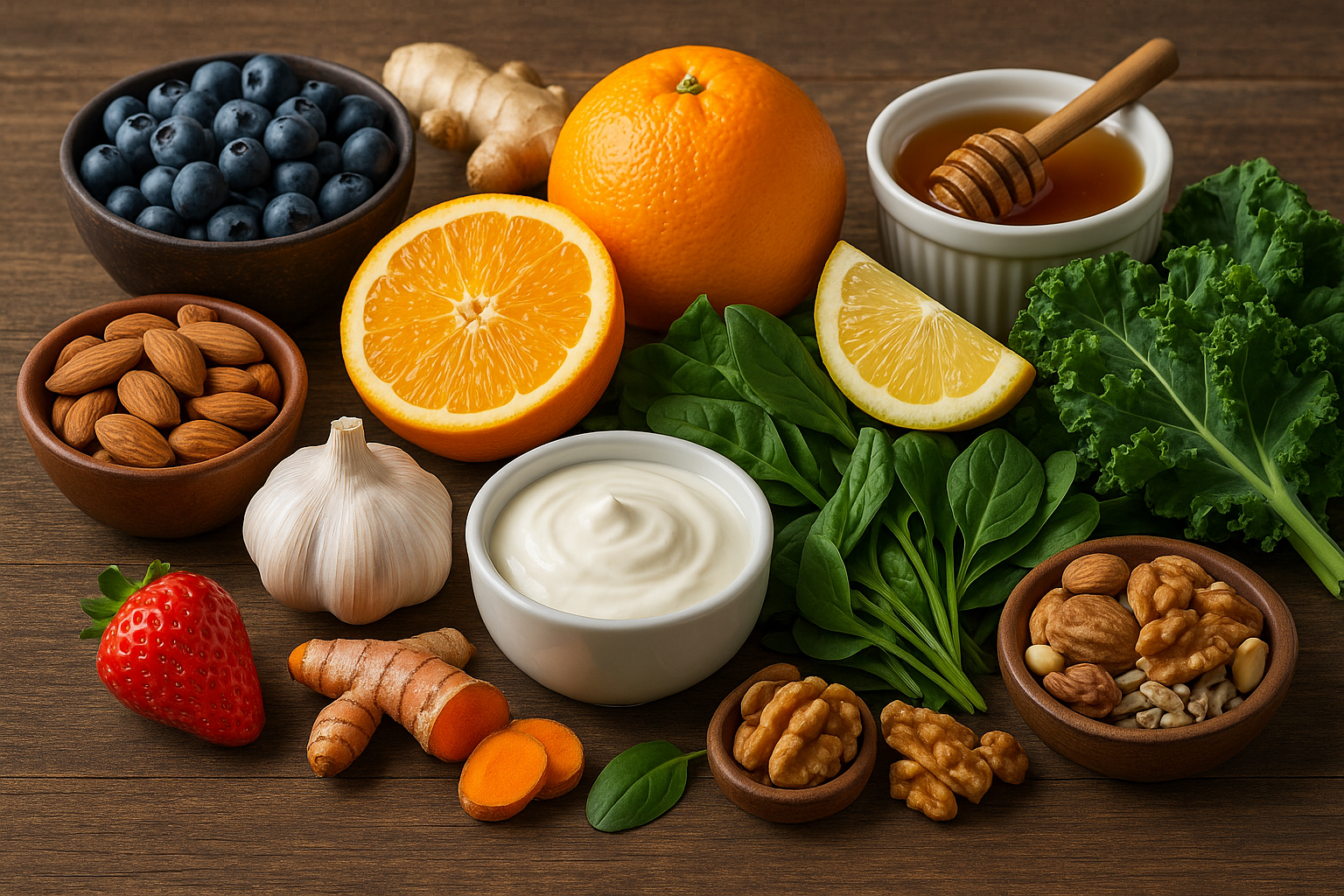Keeping the immune system strong is essential for preventing illness, improving energy, and ensuring a healthier life. While many factors influence immunity—like sleep, exercise, and stress control—nutrition plays a central role.
There are specific foods rich in vitamins, minerals, antioxidants, and bioactive compounds that enhance the body’s natural defenses. In this article, you’ll learn which foods support immunity and how to incorporate them easily into your daily life.
Why Does Immunity Depend on Nutrition?
The immune system is made up of cells, tissues, and organs that protect the body from viruses, bacteria, and other threats. To function properly, it needs specific nutrients obtained mainly from food.
Nutritional deficiencies can weaken the immune response, making the body more vulnerable. On the other hand, a balanced, nutrient-rich diet enhances antibody production, white blood cell function, and a proper inflammatory response.
1. Garlic: A Powerful Natural Antibiotic
Garlic is known for its antimicrobial and anti-inflammatory properties. It contains allicin, a sulfur compound that helps fight infections and activate immune cells.
How to consume it:
- Raw, chopped in salads
- In tea with lemon and honey
- Sautéed in soups and broths
2. Citrus Fruits: High in Vitamin C
Oranges, lemons, acerola, kiwi, tangerines, and guava are rich in vitamin C, a crucial antioxidant for immune support.
Benefits:
- Stimulates white blood cell production
- Protects against infections
- Reduces cold duration
Tip: consume citrus fruits in the morning or as natural juices during the day.
3. Ginger: Anti-Inflammatory and Thermogenic
Ginger contains gingerol, a compound with anti-inflammatory action that supports the immune response.
How to use it:
- In teas
- Grated into juice or salads
- In cooking with meats or soups
4. Natural Yogurt and Kefir: Probiotic Sources
Probiotics are beneficial bacteria that balance gut health—and about 70% of immunity is linked to the gut.
Include them in your routine:
- One cup of natural yogurt daily
- Kefir with fruits for breakfast
Avoid sugary or artificially flavored yogurts.
5. Dark Green Vegetables: Rich in Folate and Iron
Spinach, kale, broccoli, and arugula are essential for white blood cell production and immune health.
How to eat them:
- Sautéed with garlic
- In green smoothies
- In omelets or savory pies
6. Nuts, Seeds, and Almonds
These foods contain vitamin E, zinc, and selenium—antioxidants that protect immune cells from oxidative stress.
Practical ideas:
- Add to yogurt or fruit salads
- Use as an afternoon snack
- Make a nut mix to take with you
7. Honey: A Natural Immunity Ally
Honey is a natural antibacterial and a throat-soothing remedy that can help prevent infections.
Important note:
- Don’t give honey to children under 1 year
- Choose organic, pure honey
How to use:
- One teaspoon with lemon and ginger
- As a natural sweetener for tea
8. Turmeric (Curcuma): Powerful Anti-Inflammatory
Curcumin, turmeric’s main active compound, modulates immune response and reduces inflammation.
Best way to absorb it:
- Combine with black pepper and olive oil
- Use in rice, chicken, or sauces
9. Red and Purple Fruits: Potent Antioxidants
Strawberries, blueberries, blackberries, and grapes are rich in anthocyanins, compounds that strengthen immune defenses.
How to enjoy them:
- In smoothies
- In fruit salads
- With oats and yogurt
10. Water: Essential for Nutrient Transport
Hydration plays a fundamental role in immunity. Water helps eliminate toxins, transport nutrients, and maintain healthy mucous membranes in the nose and throat.
Tip:
- Drink 1.5 to 2 liters of water per day
- Use bottles to track intake
- Include unsweetened teas or lemon water
How to Build an Immune-Friendly Plate
To get all the nutrients your immune system needs, build balanced meals with:
- Lean proteins (eggs, fish, chicken)
- A variety of vegetables
- Nuts and seeds
- Vitamin C-rich or antioxidant fruits
- Whole grains (brown rice, quinoa)
Avoid ultra-processed foods, excessive sugar, and heavy alcohol intake—they weaken immunity.
Final Thoughts: Immunity Begins With Food
Maintaining a varied, colorful, and natural diet is one of the best ways to boost your immune system. You don’t need expensive diets—the key is making the right choices every day.
Add these foods to your menu and, over time, you’ll feel the difference in your energy and overall health.
